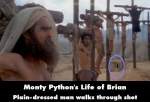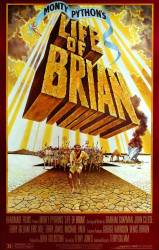
Visible crew/equipment: In the last scene while Brian and the others are singing you can see a tourist walking in the background. (01:30:30)

Directed by: Terry Jones
Starring: John Cleese, Eric Idle, Terry Gilliam, Terry Jones, Michael Palin, Graham Chapman, Carol Cleveland
Genres: Comedy
Brian ends up being crucified. A group of guards shows up with orders to release Brian, but then everyone claims to be Brian, and they end up releasing the wrong man. Then Brian's resistance group (along with his girlfriend) shows up, and they announce that Brian will become a martyr. Finally, a Crack Suicide Squad shows up, but they merely kill themselves, not doing much good. We fade out as all the crucified people sing "Always look on the bright side of life".
DaveJB

Visible crew/equipment: In the last scene while Brian and the others are singing you can see a tourist walking in the background. (01:30:30)
Jewish Official: All right, no one is to stone ANYONE until I blow this whistle! Even... And let me make this absolutely clear... Even if they do say "Jehovah"!
Trivia: The film was initially banned in Norway, for fear that it might offend some people's religious sensibilities. In neighboring Sweden, it was billed as "The film so funny it was banned in Norway"
Question: When Brian is about to be crucified, soldiers arrive with news of his release. The soldiers ask for Brian, and everybody shouts "I'm Brian." Is this a parody of the "I'm Spartacus" episode in the Kirk Douglas/Stanley Kubrick film of "Spartacus"? If so, would this support my feeling that Life Of Brian is primarily a parody of classical/biblical 'epic' films?
Answer: The scene is a parody of the scene in "Spartacus" (although they are saying "I am Brian" for completely different reasons.) However, the film is meant to be a satire on religion itself and not a parody of epic films. The Pythons did a lot of research to try and accurately portray 1st century Judea, which is why it may look like a biblical epic, but I can't recall any biblical epics they parodied. At the time it was considered blasphemous, and not a parody, and banned in several areas in the UK and some countries. Although the Pythons argued it's not blasphemy but heresy.
Answer: You are indeed correct. It is a parody of the "Spartacus" scene but mostly of religion.
Perhaps not so much a parody of "Spartacus" as a tribute to Stanley Kubrick. Monty Python writer Terry Gilliam was very much a fan of Kubrick films and became friends with Kubrick in the 1980s. Gilliam claimed that Kubrick had even spoken with him about making a sequel to Kubrick's "Dr. Strangelove" (with Gilliam as director). Chances are, the "Spartacus" allusion was part of Gilliam's contribution to the "Life of Brian" screenplay, a tip-o-the-hat to Stanley Kubrick.
Answer: Actually, no, the primary goal of "Life of Brian" was not to parody biblical films. Terry Gilliam has stated that the "important" objective of the movie was "to offend a lot of people," particularly "Jews and Christians, because they're easy to push around." Gilliam further said that, at the same time, they were "very cautious not to offend Muslims, because they're the dangerous ones." Both Gilliam and John Cleese have also said that, while the Pythons took care to avoid blasphemy (not directly mocking Jesus of Nazareth, with whom the Pythons had no quarrel), they fully intended that the film be heretical (in defiance of Catholic Church doctrine and dogma). Make no mistake, "Life of Brian" is not supposed to be a lighthearted parody of biblical films; it's supposed to be a sharp stick in the eye to the Roman Catholic Church.
Charles Austin Miller